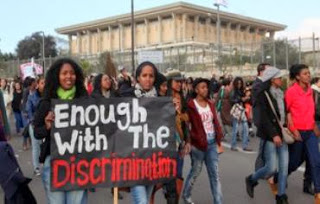48.9% of Jews agree with the statement that Jews should have more rights than non-Jews
 |
| Ethiopia’s Black Jews Demonstrate Against Israeli Jewish Racism – Many Israeli Jews don’t see them as Jewish unlike non-Jewish white Russians |
An Israeli comrade writes:
‘This is the Haaretz English story on this important poll, which happens to be the ‘positive spin’ version… The Hebrew story (link below), written by a different journalist (Jonathan Lis), is the ‘realistic version’ pointing to the same stats but in a rather different light, which is far more critical. The Hebrew header reads “Democracy Index: Half the Public Supports Preferential Rights to Jews” (obviously, the “public” here is the Jewish public). The Hebrew version starts by pointing to the finding that 48.9% of the the Jews agree with the statement that Jews should have more rights than non Jews, a significant increase since 2009. It then focuses on the deterioration of the ‘balance’ between democratic and Jewish state where, among those polled, ‘democratic’ loses in favor of ‘Jewish’.
As is clearly demonstrated by the article header and sub-header, below, the English version is a different story altogether, focusing on those parts of the survey whose results display “improvements” over past years. For example, Arabs are no longer the number one on the list of undesirable neighbors; since the last survey, they’ve been replaced by foreign workers… (They surely must feel much better about this one…) Only towards the end of the English version coverage of the ugly reality returns, but with less emphasis and detail than can be found in the Hebrew version.’
 |
| Israeli flag flying over Maale Adumim – Israeli settlement just outside Jerusalem |
English: http://www.haaretz.com/news/national/.premium-1.550838
Hebrew: http://www.haaretz.co.il/news/politi/.premium-1.2133862
Among Israeli Jews – Poll: Jewish majority more important than West Bank sovereignty
Fewer Jewish Israelis favor policies that encourage Arab emigration away from Israel, compared with past.
By Judy Maltz | Oct. 6, 2013
Almost two-thirds of Israeli Jews believe it is more important for their country to maintain a Jewish majority than to maintain sovereignty over the West Bank. Only 21 percent feel maintaining sovereignty over the West Bank is more important than preserving the Jewish majority and 7 percent believe both are equally important.
These were among the findings of the 2013 Israeli Democracy Index, published Sunday by the Guttman Center for Surveys. The index, released annually since 2003, measures trends in public opinion.
The findings also indicate what might be considered a softening in attitudes of Jewish Israelis toward the country’s Arab citizens. About 44 percent of Jewish respondents said this year that they favored government policies that encourage Arab emigration, down from 51 percent in 2010 and 54 percent in 2009 – the last two times this question was asked in the survey.
Similarly, the survey shows that Arabs no longer top the list of neighbors Israeli Jews would consider undesirable, replaced now by foreign workers. Almost 57 percent of Jewish respondents said that having foreign workers as neighbors would bother them. Next in line among those considered undesirable neighbors for Israeli Jews were an Arab family (48 percent), a homosexual couple (30.5 percent), ultra-Orthodox Jews (21 percent) and Shabbat desecrators (10 percent).
Slightly over 46 percent of Arab respondents said that having homosexual neighbors would bother them. Next in line among those considered undesirable neighbors for Arab Israelis were a Jewish family (42 percent) and foreign workers (31 percent).
The Israeli Democracy Index bases itself on a representative sample of 1,000 Israeli adults. The following are some other key findings published on Sunday:
A substantial majority of Jewish Israelis (63 percent) believes soldiers do not have the right to refuse to serve in the West Bank because they oppose the occupation. Slightly over half believe soldiers do not have the right to disobey an order to evacuate settlements either.
More than half of Israeli Jews (52 percent) believe that human and civil rights organizations, such as the Association for Civil Rights in Israel (ACRI) and B’Tselem, harm the state, while 36 percent disagree.
Overall, young Israeli Jews are more patriotic and right-wing in their leanings than their elders.
Close to half (49 percent) of all Israeli Jews believe that Jewish citizens should have more rights than non-Jewish citizens.
Most Jews feel that critical national decisions should be determined by a Jewish majority, both on matters of peace and security (67 percent) and on socioeconomic issues (57 percent).
Roughly one out of every three Israeli Jews (31 percent) believes that only Jews should determine the outcome of a referendum on peace that includes withdrawal from the West Bank.
Three-quarters of Israeli Jews believe Israel can be both a Jewish and democratic state. Only one-third of Arab respondents shared this view.
Roughly one-third of the Jewish respondents think the Jewish component of Israel’s definition as a Jewish and democratic state is more important, while 29 percent attach greater importance to the democratic component. The percentage of respondents who prefer the combined definition “Jewish and democratic” has declined steadily in recent years, reaching 37 percent this year.
The share of Jewish respondents who would choose democratic principles over Jewish religious law in the event of a conflict between the two is 43 percent – much higher than the 28 percent who would opt for the latter.
Jewish Israelis most frequently assess the country’s overall situation as “so-so” (43 percent,) with 37 percent calling it “good” and 18 percent calling it “bad.” A much higher percentage of Israeli Arabs (39 percent) consider the situation “bad.”
An overwhelming 83 percent of Jewish Israelis said they are proud to be Israelis and two-thirds said they feel part of the state and its problems. Among Arabs, only a minority of 40 percent said they felt proud to be Israeli or have a sense of belonging to the country (28 percent).
About 42 percent of Israelis feel the right to live with dignity is upheld “too little” or “far too little” in the country.
Almost two-thirds of Israelis believe it is important to narrow socioeconomic gaps in the country even if this means raising taxes.
As in past surveys, the army topped the list of institutions and public servants deemed trustworthy by Jewish Israelis, followed by the president of Israel. Among Arab citizens, the Supreme Court topped the list, followed by the media.
Although the assessment of Knesset members’ performance has improved somewhat, compared with previous surveys, more than two-thirds of Israelis still feel that their politicians are more concerned with their own interests than those of the public.
